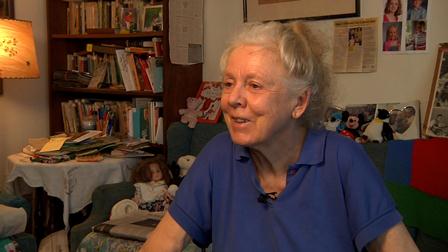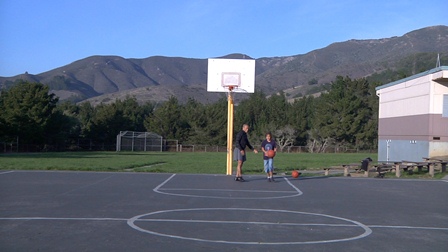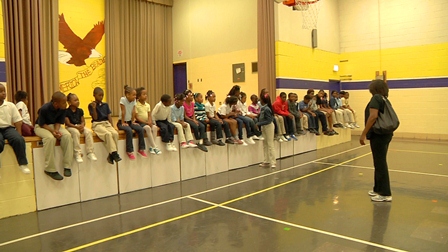Kickstarter Project Remember Me Sue Honors Life Work of Educator Susan Duncan (original) (raw)
Film Tue Oct 30 2012
 Susan "Sue" Duncan is losing her life to Alzheimer's. At the same time, Melina Kolb is racing to make a documentary about her legacy.
Susan "Sue" Duncan is losing her life to Alzheimer's. At the same time, Melina Kolb is racing to make a documentary about her legacy.
Duncan is the founder of the Sue Duncan Children's Center, a year-round after-school program, (and the mother of U.S. Secretary of Education, Arne Duncan). Kolb, 28, is a former employee of Duncan's who launched a Kickstarter campaign on October 1 to produce Remember Me Sue.
Kolb worked at the center, which is currently run at Jackie Robinson Elementary school and an independent organization from the school, off and on from 2003 until 2010. She was assigned to her position at random as part of her college work study while she attended the University of Chicago as an Anthropology student.
"I wasn't expecting anything," says Kolb. "Sue has this effect on people; just this immediate connection that pulls you in. I remember meeting her on the first day, and she asked me, 'What do you think of my center?'"
The center has a reputation. Since 1961, the Sue Duncan Children's Center has been serving the South Side's predominantly low-income, black population tutoring, recreation and free nutritious meals. Yet Duncan made it more than just an after-school program.
 Alumni who started from humble beginnings go on to become successful leaders and innovators. The late Michael Clarke Duncan, who received an Oscar nomination for his performance in The Green Mile, credited Duncan for his success, Kolb says. Kerrie Holley, Chief Technology Officer of IBM's Worldwide Global Business Services, considered Duncan a second mother to him when he was growing up in Chicago. Holley (playing basketball with his son in the photo above) is an IBM Fellow -- the company's highest technical leadership position.
Alumni who started from humble beginnings go on to become successful leaders and innovators. The late Michael Clarke Duncan, who received an Oscar nomination for his performance in The Green Mile, credited Duncan for his success, Kolb says. Kerrie Holley, Chief Technology Officer of IBM's Worldwide Global Business Services, considered Duncan a second mother to him when he was growing up in Chicago. Holley (playing basketball with his son in the photo above) is an IBM Fellow -- the company's highest technical leadership position.
Duncan used a tough love approach and held everyone to a high level of discipline. Students at the center need to follow several rules: tucking in their shirts, folding their hands, sitting straight, not chewing gum in class -- and basically avoiding drawing any negative attention to themselves. If students misbehave, they aren't allowed to go to gym. If they are particularly bad they are sent home. But at the end of the day, Kolb says, they want to be there because it's a blast.
Duncan started slowing down in 2010. She became more agitated and would repeat a lot of the same discussions. The kids would say, "We already talked about this," Kolb explains. Employees monitored her more as she became less able to cope with being around 60 to 80 children. Then she was diagnosed with Alzheimer's in 2011.
Duncan had performed so badly on the memory tests, the doctors were surprised she was still going to work. Duncan's youngest son Owen, who had been driving her to the center up until the diagnosis, broke the news to her that she had to retire from working at the center. Owen took over as Director of the center and would call Duncan every day to tell her that she couldn't go to work, but she kept thinking she was going. However, Kolb says Duncan came to accept that she's not going to return to work.
It was Duncan's Alzheimer's that prompted Kolb to take on a project documenting Duncan's life work. "When someone is losing memory by the day, it puts pressure on you to capture their story before it's gone forever."
Kolb says she's probably the only person who can make a documentary about Duncan. Because of her illness, Duncan can't make new connections. But she remembers Kolb as the girl with the camera in her face and she's comfortable letting her film her.
 Kolb started filming Duncan in 2004 for a six-minute documentary, Sue's Room, a project that began in an undergraduate film-making class. She submitted the documentary to a contest Current TV and Independent Film Week (now International Filmmaker Project) hosted, and it was one of 10 winners selected to screen on Current TV and at the IFP Market festival in 2006.
Kolb started filming Duncan in 2004 for a six-minute documentary, Sue's Room, a project that began in an undergraduate film-making class. She submitted the documentary to a contest Current TV and Independent Film Week (now International Filmmaker Project) hosted, and it was one of 10 winners selected to screen on Current TV and at the IFP Market festival in 2006.
Sue's Room captured how Duncan creates a community at the center. "A big part of that movie was depicting what everyone calls 'circle.' Everyone, even if they had homework, would stop and spend an hour sitting in a circle. And Sue would just start a discussion about whatever came up."
In one scene in the short, Duncan asks, "How many young black men were killed in Chicago last year?" Duncan wants to hear what the children have to say about the violence and crime happening in their neighborhood. The purpose was to get the students to realize there's an alternative way to the life than what they know.
"For all the kids, it's like she opens up a different way of looking at the world besides what they're seeing," Kolb says.
 Kolb estimates she needs 20 more shoots to finish the movie before wrapping in June 2013. She's interviewing current students as well as alumni Duncan would speak highly of -- such as Kerrie Holley, the IBM Fellow, and Michelle Gordon, an international award-winning martial artist who teaches Tae-Kwon-Do.
Kolb estimates she needs 20 more shoots to finish the movie before wrapping in June 2013. She's interviewing current students as well as alumni Duncan would speak highly of -- such as Kerrie Holley, the IBM Fellow, and Michelle Gordon, an international award-winning martial artist who teaches Tae-Kwon-Do.
"Sue's helped so many people in the past and now they're living out their lives. Despite the fact that she's not working anymore, her effect is still going on."
Kolb is hoping to reach her Kickstarter goal of $15,000 by November 1. Watch the trailer for the documentary here.
